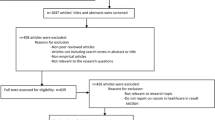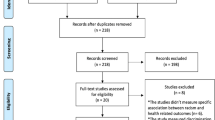Abstract
Fatalism has been identified as a crucial barrier to participation in cancer screening among African Americans. The essence of fatalism is woven throughout the lived experience for some African Americans. Therefore, to fully understand its impact, fatalism must be viewed within its broadest historical and sociocultural context. This article explores the philosophical origins and the practical significance of fatalism with regard to cancer screening among this population. Health care professionals must position themselves to promptly identify fatalistic persons. Interventions to successfully negate the influence of fatalism are needed.
Similar content being viewed by others
References
1994 Cancer facts and figures. New York: American Cancer Society, 1994.
Cancer and the poor: A Report to the Nation. Atlanta: American Cancer Society, 1990.
Barresi, C. and Menon, G. “Diversity in Black Family Caregiving.” In Z. Harel, E. McKinney, and M. Williams, (eds.).Black Aged: Understanding diversity and Service Needs, Newbury Park: Sage, 1990, 221–235.
Blendon, R., Aiken, L., Freeman, H., and Corey, C. “Access to Medical Care for Black and White Americans: A matter of continuing concern.”Journal of the American Medical Association, 1992, 261: 278–281.
Boring, C., Squires, T., and Heath, C. “Cancer statistics for African-Americans.”Ca-A: Cancer Journal of Clinicians, 1992, 42: 7–17.
Campbell, K., (ed.).The State of Black South Carolina: 1992–1993. Columbia, SC: Columbia Urban League, 1993.
Clavon, A. “The Black Elderly.”Journal of Gerontological Nursing, 1986, 12: 6–12.
Dyson, M.Reflecting Black: African American Cultural Criticism. Minneapolis: University of Minnesota Press, 1993.
Escarce, J., Epstein, K., Colby, D., and Schwartz, S. “Racial Differences in the Elderly's Use of Medical Procedures and Diagnostic Tests.”American Journal of Public Health, 1993, 83: 948–954.
Franklin, J. and Moss, A.From Slavery to Freedom: A History of Negro Americans, New York: McGraw Hill, 1988.
Freeman, H.Cancer and the Socioeconomic Disadvantaged. Atlanta: American Cancer Society, 1989.
Guillory, J. “Ethnic Perspectives of Cancer Nursing: The Black American.”Oncology Nursing Forum, 1987, 14: 66–69.
Hecht, M., Collier M., and Ribeau, S.African American Communication: Ethnic Identity and Cultural Interpretation, Newbury Park: Sage Publications, 1993
Kierkegaard, S.Concluding Unscientific Postscript, Princeton: Princeton University Press, 1947.
LaVeist, T. “Beyond Dummy Variables and Sample Selection: What Health Services Researchers Ought to Know about Race as a Variable.”Health Services Research, 1994, 29: 1–16.
Porter, C. and Villarruel, A. “Nursing Research with African American and Hispanic People: Guidelines for Action.”Nursing Outlook, 1993, 41: 59–66.
Pounds, M. “The Culture of Poverty in the Black American.”Proceedings of the National Advisory Committee on Cancer in the Socioeconomically Disadvantaged. Atlanta: American Cancer Society.
Powe, B.D.Fatalism and Participation in Colorectal Cancer Screening among Poor, Elderly Black Individuals, 1994, Unpublished doctoral dissertation.
Russell, K. and Jewell, N. “Cultural Impact of Health Care Access: Challenges for Improving the Health of African Americans.”Journal of Community Health Nursing, 1992, 9: 161–191.
Thurman, H.Jesus and the Disinherited. New York: Harper, 1949.
U.S. Department of Health and Human Services, Public Health Service.Healthy people 2000: National health promotion and disease prevention objectives. DHSS Pub. No. (PHS) 91-50213. Washington, DC: U.S. Government Printing Office, 1990.
West, C.Race Matters, Boston: Beacon Press, 1993.
West, C.Prophesy Deliverance: An Afro-American Revolutionary Christianity. Philadelphia: Westminster, 1982.
Wilkes, G., Freeman, H., and Prout, M. “Cancer and Poverty: Breaking the Cycle.”Seminars in Oncology Nursing, 1994, 10: 79–88.
Young, H.Hope in Progress. Minneapolis: Fortress Press, 1990.
Author information
Authors and Affiliations
Rights and permissions
About this article
Cite this article
Powe, B.D., Johnson, A. Fatalism as a barrier to cancer screening among African-Americans: Philosophical perspectives. J Relig Health 34, 119–126 (1995). https://doi.org/10.1007/BF02248767
Issue Date:
DOI: https://doi.org/10.1007/BF02248767




